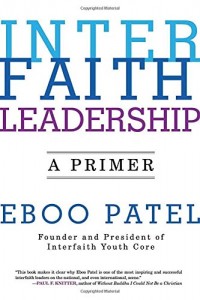Professional Pluralism
January 12, 2017 To support my volunteer work with SevenDays, which seeks to promote interfaith dialogue among all people to identify commonalities and overcome evil with acts of kindness, earlier this week, I and some friends had the chance to spend a day in Chicago with the Interfaith Youth Core (“IFYC”). The organization was founded by the inspirational Eboo Patel and is building a movement of people from all faiths and traditions who are working together to change the world. We wanted to learn more about its mission, operations and lessons learned over 15 years in practice so that we could apply it to our own efforts. It was a very meaningful, productive, energizing experience.
To support my volunteer work with SevenDays, which seeks to promote interfaith dialogue among all people to identify commonalities and overcome evil with acts of kindness, earlier this week, I and some friends had the chance to spend a day in Chicago with the Interfaith Youth Core (“IFYC”). The organization was founded by the inspirational Eboo Patel and is building a movement of people from all faiths and traditions who are working together to change the world. We wanted to learn more about its mission, operations and lessons learned over 15 years in practice so that we could apply it to our own efforts. It was a very meaningful, productive, energizing experience.
At the heart of IFYC’s purpose is to foster a religiously pluralistic society. In fact, IFYC representatives work on more than 400 college campuses across the country to engage students in this mission as they believe it permeates all aspects of life.
Here’s the premise: We often hear about the importance of diversity. However, as described in Eboo’s recently published, Interfaith Leadership, if diversity is “simply the fact of people with different identities interacting with one another,” pluralism is the “energetic engagement of diversity toward a positive end.”
He says this about diversity vs. pluralism as they pertain to interfaith interactions:
The various definitions of the term ‘interfaith’ highlight diversity gathered, including the divergent and incompatible views people within the group held. For this diversity to achieve pluralism, an interfaith leader has to engage the group in a manner that accommodates the deeply held identity differences and the inevitable conflicts these differences imply, while at the same time building agreement, consensus, and general participation in the oneness of the community.
Eboo’s concept for pluralism is part of a three-pronged framework which includes a) respect for identity, b) relationships between different communities and c) commitment to the common good.
I love this concept and believe that it can be applied very directly to networking. In fact, just for fun, let’s call it “Professional Pluralism.” My thought is this: It’s not enough to ask someone what they do for a living and get the answer, “I’m a consultant” or “I’m in financial services” or “I’m in manufacturing” or “I’m an entrepreneur” or whatever. If you take that at face value, you still really know nothing of the person, his/her career, how they operate, the way they think or what’s important to them.
However, if you seek to spend time with them. To understand that not only is your contact a consultant, but she is a consultant who helps mid-sized companies to identify, outline and activate their long-term strategies, you suddenly know a lot more about what makes her tick! You might also learn about the challenges she is facing in her business, relate your own experiences back to hers and uncover opportunities for collaboration and mutual support. Voila!
No doubt, this idea of Professional Pluralism takes active engagement, conversation, discussion, questions, answers, lots of listening and, of course, time.
I believe that by having a highly pluralistic relationship base, we will be enriched both personally and professionally. By knowing many people of different backgrounds, experience sets, industries and the like, we will be better equipped to address opportunities and challenges as they arise by calling on our networks to provide the support and championship we need.
How pluralistic is your network? Please share your thoughts and stories with the CLC Community at CoffeeLunchCoffee.com.

